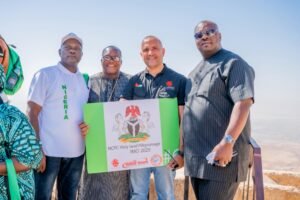Nigeria Rejects U.S. Plan to Deport Venezuelan Prisoners: “We Have Enough Problems” — Tuggar
By Anthony Toruka

RIO DE JANEIRO — Nigeria’s Foreign Affairs Minister, Yusuf Tuggar, has strongly rejected U.S. efforts to make Nigeria accept deported Venezuelan prisoners, saying the country already faces “enough problems of our own.” Tuggar made the comments during the BRICS Summit in Brazil on Friday (Reuters, The Guardian).
“It will be difficult for a country like Nigeria to accept Venezuelan prisoners into Nigeria. We have enough problems of our own,”
— Yusuf Tuggar, via Channels TV, July 11, 2025
Tuggar was responding to reports that the U.S. government, under President Trump, had urged certain African countries during a White House summit—including Gabon, Liberia, Mauritania, Senegal, and Guinea-Bissau—to receive migrants deported from the United States. The move reportedly covered Venezuelans, some recently released from U.S. prisons (Financial Times).
Speaking later on Channels TV’s *Politics Today*, Tuggar described the pressure as “strong‑arming” and emphasised Nigeria’s internal challenges: a population of over 230 million, security threats, economic crises, and existing migration burdens (TheCable, Tribune).
He also clarified that Nigeria had not made any changes to its visa policy for U.S. citizens, dismissing speculation that the move was retaliatory (Guardian). Instead, Abuja is focusing on diplomatic engagement to address broader tensions related to migration, security, and visa access.
This stance follows increased U.S. deportation activity since January, with over 200,000 migrants removed—including nearly 3,700 Nigerians in ICE enforcement pipelines. An initial batch of 85 deportees was expected to arrive in Lagos earlier this year, though no confirmed date was given (Reuters, Premium Times).
Analysts warn that the dispute could strain Nigeria–U.S. relations further—especially as visa restrictions already limit Nigerian travelers to single-entry, 90-day U.S. visas (Reuters).
For now, Nigeria insists on mutual respect and dialogue, urging the U.S. to recognise Nigeria’s existing humanitarian commitments and avoid placing additional burdens on an already strained system.
Sources: Reuters, Financial Times, Guardian, TheCable, Tribune, Premium Times




